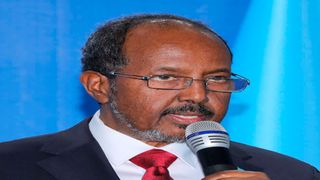
President Hassan Sheikh Mohamud of Somalia.
| File | AFPNews
Prime
Why ball is back in Somalia's court after EAC admission
The ball is back in Somalia's court to domesticate the East African Community protocols so that the country can start enjoying the benefits that come with membership.
Somalia officials have spent the past two weeks telling the world how ready they are to join and enjoy the benefits of East African Community membership. But that will depend on how soon they domesticate the protocols of the bloc, experts say.
Mohamud Abdurahman Benebene, Somalia’s Minister for Planning, Investment and Economic Development, this week pledged to institute a stronger data collection policy for his country to be at par with peers. This, he said, was part of the pitch when the high-level delegation toured Burundi recently for the final submissions for membership.
“I feel confident that our recent visit to Burundi and the strong data we supplied to the seven-member body will ease our bid to join the East African Community,” Mr Banabene said on the World Statistics Day in Mogadishu.
One exciting opportunity, argued Somali Minister of Commerce Jibril Abdirashid Haji Abdi, is the fact that Somalis may soon travel freely within the region.
The Somali passport would be integrated into the East African Community, facilitating flawless movement for Somalia citizens within the EAC. And Somali labour experts have welcomed the entry, seeing it as helpful to its nascent human resource.
“We firmly believe that Somalia's membership in the EAC will create a wealth of opportunities for economic growth, enhanced trade relations and social development, benefiting the people of Somalia,” Omar Faruk Osman, General Secretary, Federation of Somali Trade Unions (Festu), told The EastAfrican.
“As trade unions, we see immense value in this integration, as it opens doors for increased job opportunities, improved working conditions and the sharing of best practices among member states.”
By being part of the EAC, Mr Faruk said, workers in Somalia “can expand their horizons” and vowed to collaborate with peers to protect the rights of workers.
In Somalia’s pitch, Mr Benebene said Somalia is bringing its contribution as “both agriculture and trade that form the backbone of our economy.”
But whether it gains anything will largely depend on the political zeal of Somalia to reform, as well as individual relations with countries of the bloc, according to diplomats familiar with integration politics.
“Probably very little (benefit) initially. The challenge will be similar to that of South Sudan as Somalia is unable to pay membership fees, and play by regional rules of the game,” said a Kenyan diplomat who has negotiated with Somali counterparts before on trade relations.
First, the diplomat noted, Somalia has acceded to the obligation of managing the movement of the people, including putting in place regulatory seasons to oversee that.
For years, Somalia’s porous borders with neighbours Kenya and Ethiopia made it difficult to cooperate on free movement. Kenya shut its border in 2009 and has recently delayed reopening it over insecurity.
Can hurt local industries
An irregular movement, he said, also means irregular movement of goods including contraband which can hurt local industries.
Somalia will hence find funding to erect border control areas including one-stop-border posts.
It will depend on the correct diplomatic strategy, he said, and it will give Kenya’s Lamu and Mombasa ports new competition even though it expands the market size for the bloc.
Idd Bedel Mohamed, a former Somali diplomat, now chairman of the US-Somalia Business Council, said he sees the potential for mutually beneficial trade relations between Somali businesses and investors in the East African market.
“The emphasis on balanced and reciprocal trade suggests a positive impact on job creation and economic growth for both Somalia and the broader East African economy,” he told The EastAfrican on Thursday. “Engaging in trade agreements is a strategic move for Somalia, aiming to capitalise on economies of scale, broaden market access, and safeguard investor rights in East African countries. This approach can enhance Somalia's economic growth by fostering exports and facilitating a more competitive and interconnected regional economy.”
Meanwhile, Heritage Institute for Policy Studies (HIPS), a think tank in Mogadishu, says Somalia must tailor its legal regime to reap from the imminent opportunities.
HIPS stated, “Boasting the longest coastline in mainland Africa, stretching over 3,000km, Somalia would provide the bloc with access to the Arabian Peninsula, offering vast opportunities for the regional market,” noting that only two EAC member states (Kenya and Tanzania) have access to the sea at the moment.
“Accession into the bloc would also offer Somali entrepreneurs enhanced investment opportunities and improve governance in line with the EAC’s regional integration components.”
“In consultation with economists and the business community, Somalia should create a comprehensive risk minimisation plan for local producers as they start to directly compete with their Kenyan counterparts,” HIPS recommended.
Additional Reporting by Abdulkadir Khalif





